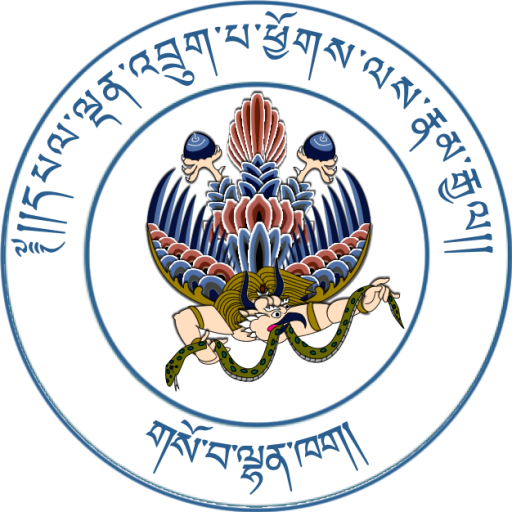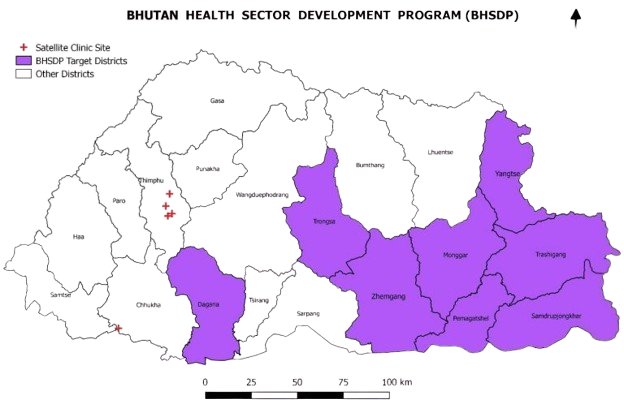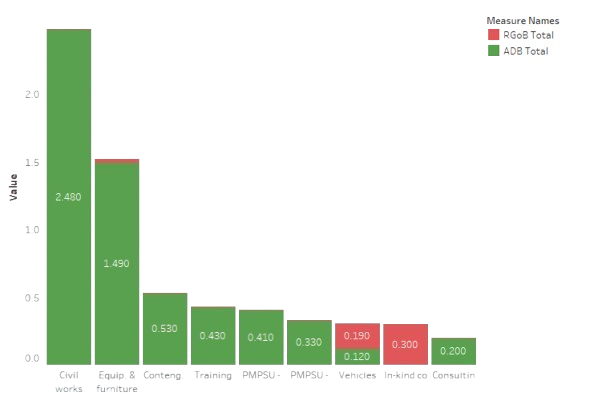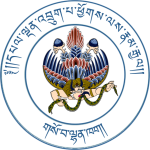ADB: Health Sector Development Program (HSDP)
Program Overview
Bhutan Health Sector Development Program (HSDP) is a joint program of Royal Government of Bhutan (RGoB) and Asian Development Bank (ADB) to help achieve equity, efficiency and sustainability of health system of the country and promote health and well-being of its people.
The HSDP will help achieve Bhutan’s’ National Health Policy goal of self-reliance and sustainability in health service delivery and ultimately towards the achievement of sustainable development goals.

HSDP Impact, Outcome & Output
The impact of the program is aligned with the National Health Policy, 2011: National health goals achieved, and self-reliance and sustainability in health service delivery achieved. The outcome identified is the equitable access, efficiency, and financial sustainability of the health system improved.
The HSDP has three outputs. The project grant will support Output 1 for PHC service delivery improvements in selected areas and the policy based grant will support Outputs 2 and Output 3 for enhanced health sector financing and improved disease surveillance and health information system, respectively.
Output 1: Primary health services especially in underserved areas improved.
This project-based output will support improvements in PHC service delivery, especially in the underserved areas. The enhanced focus on PHC will help bridge regional health disparities and improve cost-effectiveness of the health delivery system. Investments include (i) construction of five PHC satellite clinics in urban peripheries; (ii) upgrading primary health facilities with improved infrastructure provisions for infection control and waste management; (iii) medical equipment support for enhanced PHC service delivery, including immunization, and transportation of laboratory samples; (iv) support for capacity development to roll-out the Bhutan Health Standards and Quality Assurance mechanism at PHC facilities; and (v) support for health advocacy, awareness and behavior change communication through civil society organizations.
Output 2: Support for health sector financing enhanced.
This policy-based output will support enhanced health financing equity and sustainability of the Bhutan Health Trust Fund (BHTF), which core mandate is to support PHC primarily through financing of vaccines and essential medicines. The policy actions include measures to (i) enhance the BHTF operations through strengthened capital, capacity, and governance; (ii) improve equitable distribution of public health financing benefits through a benefit-incidence analysis; and (iii) develop a legal basis to support provisions for health financing equity, efficiency, and sustainability in the form of a health bill. Asian Development Bank (ADB)’s budget support under this output will contribute to BHTF capital enhancement and diversification of its investment offshore.
Output 3: Disease surveillance and health information system enhanced.
This policy-based output will improve the management and governance of Bhutan’s health information system (HIS) to support PHC and patient management, disease surveillance, and overall sector management efficiency. The program will facilitate Bhutan’s incremental move to an interoperable national HIS, from the current stage of fragmented individual systems. Policy actions include (i) development and adoption of a national e-health strategy, (ii) creation of HIS governing body, (iii) development and adoption of HIS enterprise architecture for interoperability, and (iv) development and adoption of technical standards for health data exchange. The implementation of the e-health strategy and interoperable HIS is reflected in the draft 12th Five Year Plan. ADB’s budget support under this output is expected to contribute to government spending in areas such as strategy and governance, information technology infrastructure, services and applications, data standards for interoperability, and workforce capacity development.

Bhutan: Health Sector Development Program Target Dzongkhag.
The "Bhutan: Health Sector Development Program Target Dzongkhag" is an initiative aimed at improving the healthcare infrastructure and services in specific Dzongkhags across Bhutan. The program focuses on enhancing access to quality healthcare, strengthening the capacity of health professionals, and promoting overall well-being in targeted regions. By addressing key health challenges, such as access to medical facilities and essential healthcare services, the program seeks to achieve sustainable health improvements for the population in these areas.
HSDBP Cost and Financing
The SDP is estimated to cost $41.22 million, of which ADB will finance a total of $20 million, comprising a project grant of $6 million equivalent, and a policy-based grant of $14 million. The government will provide counterpart funds totalling $21.22 million equivalent, comprising $0.52 million for output 1 (PHC), $7.71 million for output 2 (BHTF), and $13 million for output 3 (HIS/ePIS).

Project Financing
Project financing covers the output 1 and is estimated to cost $6 million. ADB will finance the expenditures for civil works, goods, consulting services, and capacity development. The government will provide counterpart support in the form of additional staff, office accommodation, meeting venues, and other in-kind contributions including local taxes and duties through exemption.
Program Financing
The program financing covers outputs 2 and output 3 and is estimated to cost $34.71 million, of which ADB will provide $14.00 million to the government to (i) increase the BHTF capital fund, and (ii) finance governance and institutional reforms related to achieving a strong national HIS.
The program will be in two tranches of $7 million each to be released in 2019 and 2020, respectively, upon meeting of the agreed conditions. The overall program financing need was estimated based on the combination of (i) BHTF assessment of its financing sustainability, and (ii) government-projected financing requirement for developing an interoperable HIS during the Twelfth Five-Year Plan. For the sustainability of the BHTF under output 2, the financing need for its enhanced capital was estimated to be around $20 million. Of this, ADB will provide a grant of $10 million (in two tranches of $5 million each) and the government will provide Nu 500.00 million ($7.71 million equivalent) to the BHTF. The BHTF is also expected to mobilize own additional funds to bridge the remaining funding gap. For the HIS program under output 3, the government estimated an overall requirement of $17 million over the medium-term (2018–2023). Of this, ADB will provide a grant of $4 million (in two tranches of $2 million each) to help finance the program, and the government will fund the remainder under the 12th Five Year Plan budget for flagship programs.
Detailed cost estimates by financer (Project Grant for Output 1)
| ADB (in million USD) | GOB (in million USD) | |||||||||
| Item | Non-tax | Tax | Total |
% of Cost Category |
Non-tax | Tax | Total |
% of Cost Category |
Total Amount |
|
| A. | Investment Costs | |||||||||
| 1 | Civil works | 2.43 | 0.05 | 2.48 | 100.0% | – | – | – | 0.0% | 2.48 |
| 2 | Equipment & furniture | 1.49 | – | 1.49 | 98.2% | – | 0.03 | 0.03 | 1.8% | 1.52 |
| 3 | Vehicles | 0.12 | – | 0.12 | 38.8% | – | 0.19 | 0.19 | 61.2% | 0.30 |
| 4 | Training | 0.43 | – | 0.43 | 100.0% | – | – | – | 0.0% | 0.43 |
| 5 | Consulting services | 0.20 | 0.00 | 0.20 | 100.0% | – | – | – | 0.0% | 0.20 |
| Subtotal (A) | 4.67 | 0.05 | 4.72 | 95.7% | 0.00 | 0.21 | 0.21 | 4.3% | 4.93 | |
| B. | Recurrent Costs | |||||||||
| 6 | PMPSU – salaries | 0.41 | – | 0.41 | 100.0% | – | – | – | – | 0.41 |
| 7 | PMPSU – expenses | 0.33 | – | 0.33 | 100.0% | – | – | – | – | 0.33 |
| 8 | In-kind contribution | – | – | – | – | 0.30 | – | 0.30 | 100.0% | 0.30 |
| Subtotal (B) | 0.74 | 0.00 | 0.74 | 71.0% | 0.30 | 0.00 | 0.30 | 29.0% | 1.05 | |
| Total Base Cost (A+B) | 5.41 | 0.05 | 5.47 | 91.4% | 0.30 | 0.21 | 0.52 | 8.6% | 5.98 | |
| C. | Contingencies | |||||||||
| 1 | Physical Contingencies | 0.42 | – | 0.42 | 100.0% | – | – | – | – | 0.42 |
| 2 | Price Contingencies | 0.11 | – | 0.11 | 100.0% | – | – | – | – | 0.11 |
| Subtotal (C) | 0.53 | 0.00 | 0.53 | 100.0% | 0.00 | 0.00 | 0.00 | – | 0.53 | |
| Total Project Cost (A+B+C) | 5.95 | 0.05 | 6.00 | 92.1% | 0.30 | 0.21 | 0.52 | 7.9% | 6.51 | |
| ADB = Asian Development Bank, GOB = Government of Bhutan, PMPSU = project management and policy support unit. | ||||||||||
| Note: Numbers may not sum precisely because of rounding. Sources: Asian Development Bank and Government of Bhutan. | ||||||||||

Implementing Agency
The Ministry of Health (MoH) as the executing agency is responsible for overall strategic planning, guidance, and management of the SDP.
Implementing Units
Implementing units of the MOH includes (i) Health Infrastructure Development Division (HIDD) responsible for the procurement and supervision of civil works, (ii) Medical Supplies Procurement Division responsible for the procurement and supervision of goods (iii) Quality Assurance and Standardization Division responsible for the training of health workers on Bhutan Healthcare Standard for Quality Assurance (BHSQA), (iv) Health Promotion Division of the Department of Public Health (DPH) responsible for training health workers on interpersonal counselling, and (v) Department of Medical Services responsible for the operation of urban satellite clinics.
PPD and Information, Communications and Technology Division of the MoH are responsible for tranche release of policy actions related to e-health services under output 2, and the BHTF is responsible for tranche release of policy actions related to the BHTF under output 3.
Project Management
Project management and policy support unit (PMPSU) established under Policy and Planning Division (PPD) of the MoH is the overall custodian of the project, it supports with planning, implementation, monitoring and supervision, and coordination of all activities under the HSDP including the implementation of the tranche release policy actions.
Five National consultants recruited since 15 August 2018 along with 5 counterpart staff from Ministry of Health including a Project Director forms the PMPSU.
| S. No. | Name | National Consultant Position |
| 1 | Sangay Tenzin | Project Manager |
| 2 | DK Bhujel | M&E Officer |
| 3 | Lhachu Wangmo | Project Assistant |
| 4 | Ugyen Gyeltshen | Civil Engineer |
| 5 | Kezang Pelden | Electrical Engineer |
| S. No. | Name | Ministry of Health Staff |
| 1 | Tashi Penjor | Project Director |
| 2 | Tashi Chozom | Project Focal |
| 3 | Tempa | Procurement Officer |
| 4 | Tshering Pelden | Project Accountant |
In addition, the project also gets support from international experts. Four expert/consultants (Financial expert, Procurement expert, BCCI-IPC expert and Quality assurance expert) were recruited to help PMPSU and implementing units for smooth implementation of the project.
Project steering committee (PSC) as the overall strategic planning, guidance, and management body meets every 6 months and Dzongkhag Management Committee meets every three months to review implementation progress and resolve constraints.
Annual project Report 2018-2019 (BHSDP).
Address
- Ministry of Health
- Kawang Jangsa
- Thimphu, Bhutan
- Post Box : 726
- info@health.gov.bt

